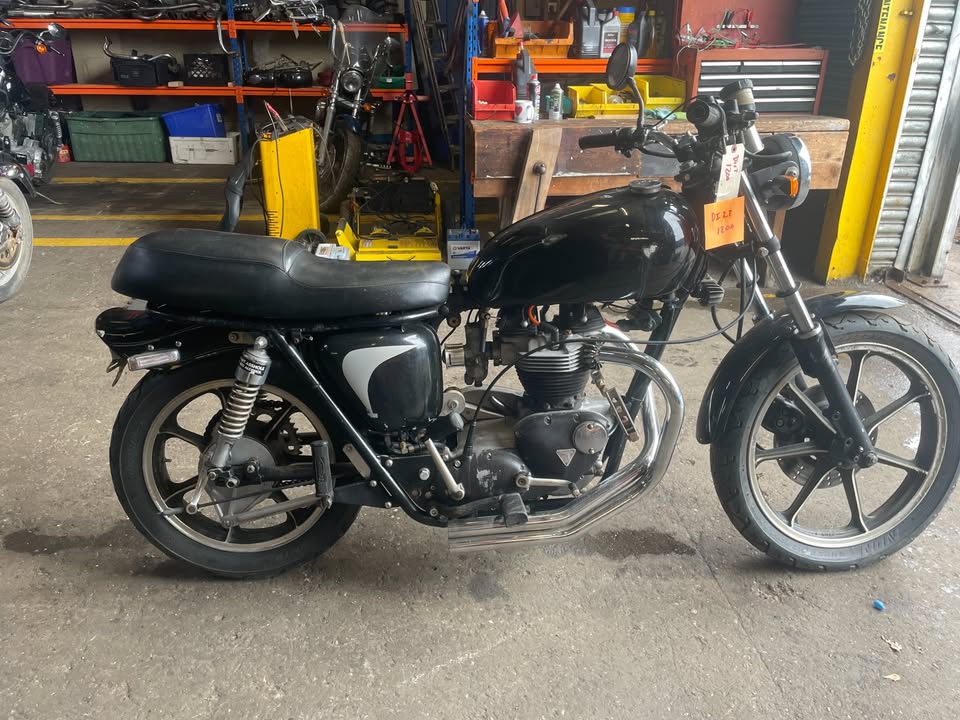Classic and Classy Motorcycles Ltd
Vintage and Classic Motorcycle Importers
1964 Triumph 6T Thunderbird 650cc Project Ref D1200

The 1964 Triumph 6T Thunderbird 650cc: A British Twin with Heritage and Style
Historical Context
The Triumph 6T Thunderbird, introduced in 1949, was developed to meet the demands of the American market, particularly for a larger, more powerful motorcycle. By 1964, the Thunderbird had become one of Triumph’s most iconic models, built at the Meriden factory and based on the successful parallel twin engine design pioneered by Edward Turner. The Thunderbird was an evolution of the Triumph Speed Twin, and the 1964 version represented one of the final years of the model before it was discontinued in 1966. Known for its smooth performance and reliable design, the 6T Thunderbird helped cement Triumph’s reputation in the United States and remained a staple on British roads.
Technical Specifications and Performance
• Year: 1964
• Make: Triumph
• Model: 6T Thunderbird
• Engine Displacement: 649cc
• Engine Type: Air-cooled OHV parallel twin
• Compression Ratio: 8.5:1
• Power Output: Approximately 42 horsepower
• Transmission: 4-speed manual with right-foot shift
• Fuel System: Single Amal Monobloc carburetor
• Braking System: Drum brakes front and rear
• Fuel Capacity: Approximately 4 gallons
• Wheelbase: 55 inches
• Top Speed: Around 100 mph
• Dry Weight: Approximately 385 pounds
Evolution of the Model
The 6T Thunderbird underwent several updates over its production run. Early models had a “sprung hub” rear suspension, which gave way to a full swingarm by the mid-1950s. By 1964, Triumph had refined the engine with alloy cylinder heads and better crankshaft balance, improving reliability and performance. This version used the classic pre-unit engine layout, where the engine and gearbox were separate. The Thunderbird remained a key part of Triumph's lineup until it was replaced by the more modern T120 Bonneville and TR6 models, which shared similar mechanical roots but focused more on performance and dual-carburetor setups.
Cultural Impact
The Thunderbird gained significant notoriety when Marlon Brando rode one in the 1953 film *The Wild One* (despite Triumph not officially endorsing the film). This helped fuel the image of Triumph as the motorcycle of choice for rebels and young riders. In the UK, it was a respected touring machine, known for its comfort and torque, and it became a favourite among dispatch riders and motorcycle police units during the 1950s and 60s. The 6T’s combination of performance, reliability, and classic styling ensured it became a cult classic among enthusiasts.
Competitors and Comparison
In 1964, the Thunderbird competed with motorcycles such as the BSA A10 Super Rocket, Norton Dominator 650SS, and the Matchless G12. While BSA offered similar performance, the Triumph’s superior styling and handling often set it apart. Japanese competitors like Honda had not yet fully broken into the big-bike segment, so British manufacturers still dominated. The Triumph’s unitary feel (despite its pre-unit engine) and smooth power delivery gave it an edge for riders seeking a reliable and stylish touring twin.
Conclusion
The 1964 Triumph 6T Thunderbird stands as a symbol of British motorcycle engineering at its peak. With its refined parallel twin engine, classic styling, and historical importance, the Thunderbird remains a sought-after classic today. Whether as a restoration project or preserved survivor, it’s a bike that commands attention and respect for its role in shaping motorcycling history.
Find Classic Motorcycles
Stay in the loop - Subscribe for Updates
One email notification a month when a new shipment arrives.